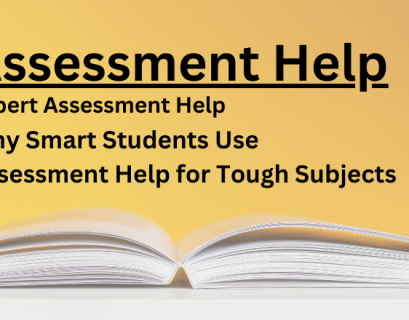When it comes to assessments, having access to the right resources can make a significant difference in your preparation and performance. With so many tools, platforms, and services available, it can be overwhelming to know where to begin. Whether you’re preparing for exams, projects, or papers, choosing the right assessment help resources is crucial for academic success. In this article, we’ll explore key factors to consider when selecting resources that will support your learning and assessment preparation.
Identify Your Learning Style
The first step in choosing the right assessment help resources is understanding your own learning style. People absorb information differently, and the effectiveness of certain resources may depend on how you learn best. Here are the four primary learning styles:
- Visual Learners: Visual learners prefer diagrams, charts, and images. Resources like video tutorials, infographics, and visual study aids like mind maps are ideal for these students.
- Auditory Learners: These learners grasp information through listening. Podcasts, recorded lectures, and audiobooks can be valuable resources.
- Kinesthetic Learners: Kinesthetic learners learn by doing and prefer hands-on experiences. Resources like practice tests, interactive simulations, and study groups may be most beneficial.
- Reading/Writing Learners: These individuals learn best through reading and writing. Text-heavy resources like textbooks, notes, and written study guides are effective for these students.
By identifying your learning style, you can choose resources that align with your preferences and enhance your learning experience.
Assess the Type of Assessment
Different types of assessments require different types of resources. It’s essential to tailor your study materials to the specific type of assessment you’re preparing for.
- Exams: If you’re preparing for a traditional exam, practice tests and past exam papers are invaluable. These resources simulate the format and style of questions you’ll face, helping you familiarize yourself with the content and time constraints. Websites like Khan Academy and Quizlet provide practice questions in a variety of subjects.
- Essays and Papers: For writing assignments, research databases like Google Scholar, JSTOR, or your institution’s library portal offer access to scholarly articles and research papers. Tools like Grammarly and Hemingway Editor can help with writing and grammar, ensuring your final submission is clear, concise, and polished.
- Projects or Presentations: For projects or presentations, project management tools like Trello or Notion can help you stay organized. If you need assistance with design, platforms like Canva or PowerPoint offer templates for creating visually appealing presentations.
- Lab Reports or Practical Assessments: If you’re dealing with a practical or lab-based assessment, simulation software or online tutorials may assist in understanding the procedures and concepts involved.
Understanding the type of assessment you’re preparing for helps narrow down the resources that will be most effective for your needs.
Consider Credibility and Accuracy
When choosing assessment help resources, it is crucial to prioritize credible and accurate information. Poor-quality resources may mislead you or offer outdated or incorrect information, negatively impacting your preparation.
- Academic Platforms: Resources like Google Scholar, PubMed, or university library portals offer access to peer-reviewed articles and academic journals, which are trusted and authoritative sources of information.
- Official Websites and Institutions: When looking for subject-specific resources, consider using materials from well-established academic institutions or official organizations. For example, if you’re preparing for a business exam, resources from Harvard Business Review or similar reputed sources can be invaluable.
- Reviews and Recommendations: Check reviews or ask professors, classmates, or tutors about the resources they’ve found useful. Websites like Trustpilot or online academic forums often have reviews of study platforms and tutoring services.
A resource’s credibility can significantly impact your preparation and performance, so ensure that it provides reliable and accurate information.
Look for Resources with Interactive Features
Interactive learning tools can be incredibly effective for deepening your understanding and improving retention of the material. Resources that offer hands-on practice, quizzes, and feedback are essential for active learning.
- Interactive Websites: Platforms like Coursera and edX provide online courses on a wide variety of subjects, with interactive features like quizzes, assignments, and discussion forums. These resources allow you to engage with the material actively, which can improve learning outcomes.
- Mobile Apps: Apps like Quizlet, Anki, or Brainscape allow you to create custom flashcards for quick revision, practice quizzes, and spaced repetition, which are great for reinforcing knowledge.
- Gamification: Some learning platforms incorporate gamification, turning your study sessions into interactive challenges. Websites like Duolingo or QuizUp make learning fun by integrating game-like elements that motivate you to study regularly.
These interactive tools help make the learning process more engaging, ensuring that you’re not just passively absorbing information but actively applying it, which is crucial for assessments.
Look for Personalized Help or Tutoring Services
Personalized support can be a game-changer when preparing for assessments, especially if you’re struggling with specific concepts or need additional help.
- Tutoring Services: Websites like Chegg Tutors, Wyzant, or Preply connect you with professional tutors who can offer personalized help tailored to your needs. Tutors can help clarify difficult concepts, provide additional practice problems, and assist with exam strategies.
- Peer Study Groups: Collaborating with peers in study groups can also be beneficial. Group study sessions allow you to share resources, discuss concepts, and learn from each other. Platforms like Discord or Slack can facilitate virtual study groups, especially for remote learners.
- Personalized Learning Platforms: Some resources, such as Khan Academy and Brilliant, provide personalized learning pathways that adapt to your progress and offer tailored suggestions for improvement. These platforms often allow you to track your progress and focus on areas where you need the most help.
Personalized resources can make a significant impact on your learning and can be especially valuable for complex or challenging topics.
Ensure Accessibility and Convenience
The best assessment help resources are those that are easily accessible and convenient for you to use. Look for platforms that offer flexibility in terms of availability, content format, and device compatibility.
- Online Resources: Online platforms like Quizlet, Coursera, or Khan Academy offer on-demand access to study materials, meaning you can study at your own pace, at any time and from any location.
- Mobile Apps: If you’re always on the go, mobile apps allow you to study wherever you are. Flashcard apps, note-taking apps, and practice test apps can be used on your smartphone, so you can study during short breaks or commutes.
- Offline Access: Some resources offer offline access, allowing you to download study materials or videos to use when you don’t have an internet connection. This is useful if you live in an area with limited internet access or if you want to study without distractions.
Choosing resources that fit seamlessly into your lifestyle ensures that you can stay consistent with your preparation.
Look for Affordable or Free Options
Assessing your budget is important when selecting help resources, especially with the wide variety of paid and free options available.
- Free Resources: Many universities, libraries, and educational websites offer free resources such as eBooks, practice papers, video tutorials, and online courses. Websites like Khan Academy, OpenStax, and YouTube’s educational channels are great places to start.
- Affordable Alternatives: Platforms like Coursera, Udemy, or Skillshare often offer affordable courses or subscriptions that provide in-depth content and guidance for a variety of subjects. They often offer financial aid or discounts as well.
Being strategic about your budget ensures that you access high-quality resources without overspending.










